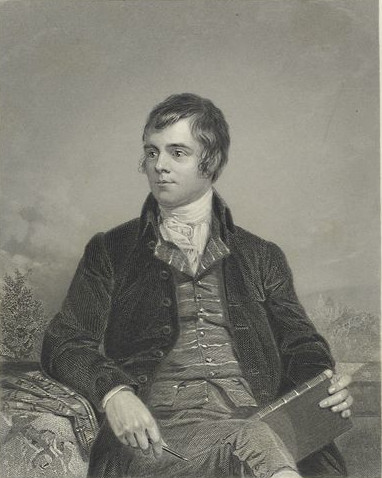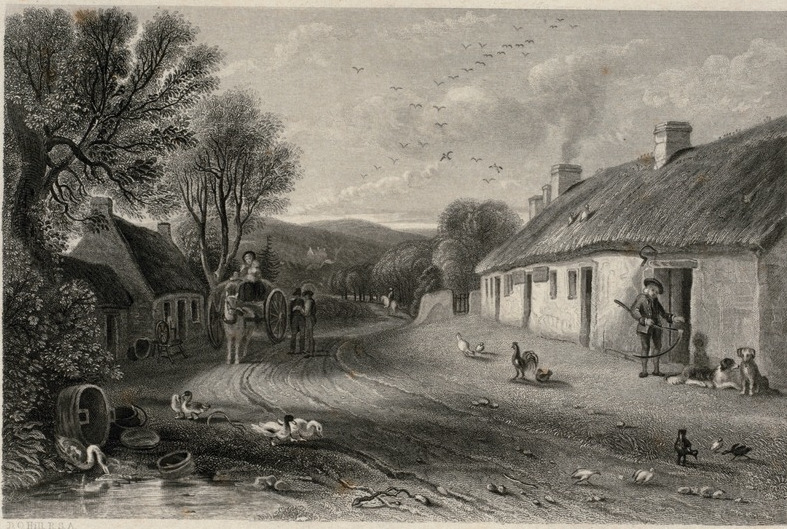Scotland has produced many famous poets and writers, but none have eclipsed its greatest literary hero, Robert Burns. Born in 1759, just 14 years after the last Jacobite Uprising, Burns spearheaded the Romantic movement in Scotland. His poems and lyrics focused on idyllic, natural subjects, typically written in English with a noticeable Scottish accent. Among his many works are classics like “Auld Lang Syne,” “Address to a Haggis,” and “A Red, Red Rose.”
Beyond his own creations, Burns is also remembered for his work documenting the folk poetry, songs, and lore of Scotland. He collected these works at a time of rapid change—the dawn of the industrial era after centuries of political turmoil and rebellions. Burns helped set Scotland’s modern identity, a legacy that has never been forgotten. Every year on his birthday, January 25, fans around the world gather for ‘Burns Suppers.’ There, they eat traditional Scottish foods, including the fabled haggis, recite his poetry, and celebrate Scottish heritage in general.
This lecture from the Library of Congress, featuring Fulbright Scholar and Kluge Fellow Arun Sood, explores the global influence of Robert Burns, especially his memory and impact in the United States:
And if you’re not burned out yet, you may enjoy two more of Robert Burns’ most famous poems:
For A’ That and A’ That
Is there, for honest poverty.
That hangs his head, and a’ that?
The coward-slave, we pass him by.
We dare be poor for a’ that!
For a’ that, and a’ that.
Our toils obscure, and a’ that;
The rank is but the guinea stamp:
The man’s the gowd for a’ that.What tho’ on hamely fare we dine,
Wear hodden-gray, and a’ that;
Gie fools their silks, and knaves their wine,
A man’s a man for a’ that.
For a’ that, and a’ that.
Their tinsel show, and a’ that;
The honest man, tho’ e’er sae poor.
Is King o’ men for a’ that.You see young birkie, ca’d a lord,
Wha struts, and stares, and a’ that;
Tho’ hundreds worship at his word,
He’s but a coof for a’ that;
For a’ that, and a’ that.
His ribbon, star, and a’ that,
The man of independent mind.
He looks and laughs at a’ that.A prince can mak a belted knight,
A marquis, duke, and a’ that;
But an honest man’s aboon his might,
Guid faith he mauna fa’ that!
For a’ that, and a’ that.
Their dignities, and a’ that.The pith o’ sense, and pride o' worth.
Are higher rank than a’ that.
Then let us pray that come it may.
As come it will for a’ that;
That sense and worth, o’er a’ the earth,May bear the gree, and a’ that.
For a’ that, and a’ that,
It’s coming yet, for a’ that,
That man to man, the warld o’er,
Shall brothers be for a’ that.
To a Mouse, on Turning Her Up in Her Nest With the Plough, November, 1785.
Wee, sleekit, cow’rin, tim’rous beastie,
O, what a panic’s in thy breastie!
Thou need na start awa sae hasty,
Wi’ bickering brattle!
I wad be laith to rin an’ chase thee,
Wi’ murd’ring pattle!I’m truly sorry man’s dominion
Has broken Nature’s social union,
An’ justifies that ill opinion.
Which makes thee startle,
At me, thy poor, earth-born companion,
An’ fellow-mortal!I doubt na, whiles, but thou may thieve;
What then? poor beastie, thou maun live!
A daimen-icker in a thrave
’S a sma’ request:
I’ll get a blessin wi’ the lave,
And never miss’t!Thy wee bit housie, too, in ruin!
Its silly wa’s the win’s are strewin!
An’ naething, now, to big a new ane,
O’ foggage green!
An’ bleak December’s winds ensuin,
Baith snell an’ keen!Thou saw the fields laid bare and waste.
An’ weary winter comin fast.
An’ cozie here, beneath the blast.
Thou thought to dwell,
Till crash! the cruel coulter past.
Out thro’ thy cell.That wee bit heap o’ leaves an’ stibble.
Has cost thee mony a weary nibble!
Now thou’s turn’d out, for a’ thy trouble.
But house or hald.
To thole the winter’s sleety dribble,
An’ cranreuch cauld!But, Mousie, thou art no thy lane.
In proving foresight may be vain,
The best laid schemes o’ mice an’ men
Gang aft a-gley.
An’ lea’e us naught but grief an’ pain.
For promis’d joy.Still thou art blest, compar’d wi’ me!
The present only touclieth thee:
But, Och! I backward cast my e’e
On prospects drear!
An’ forward, tho’ I canna see,
I guess an’ fear!
Further Reading
Burns, Robert. Robert Burns. The American Library Co., 1902.
About TOTA
TOTA.world provides cultural information and sharing across the world to help you explore your Family’s Cultural History and create deep connections with the lives and cultures of your ancestors.



